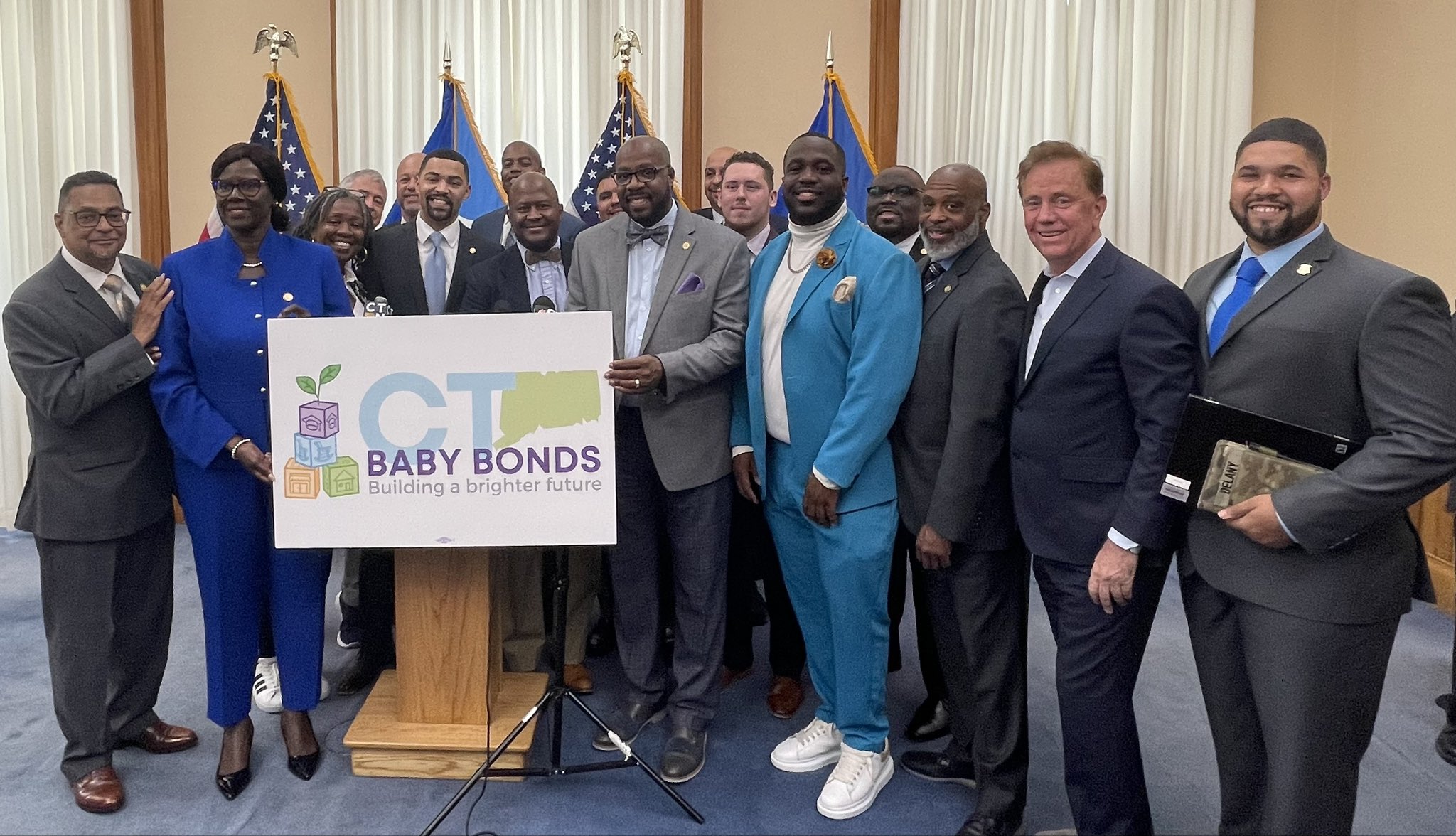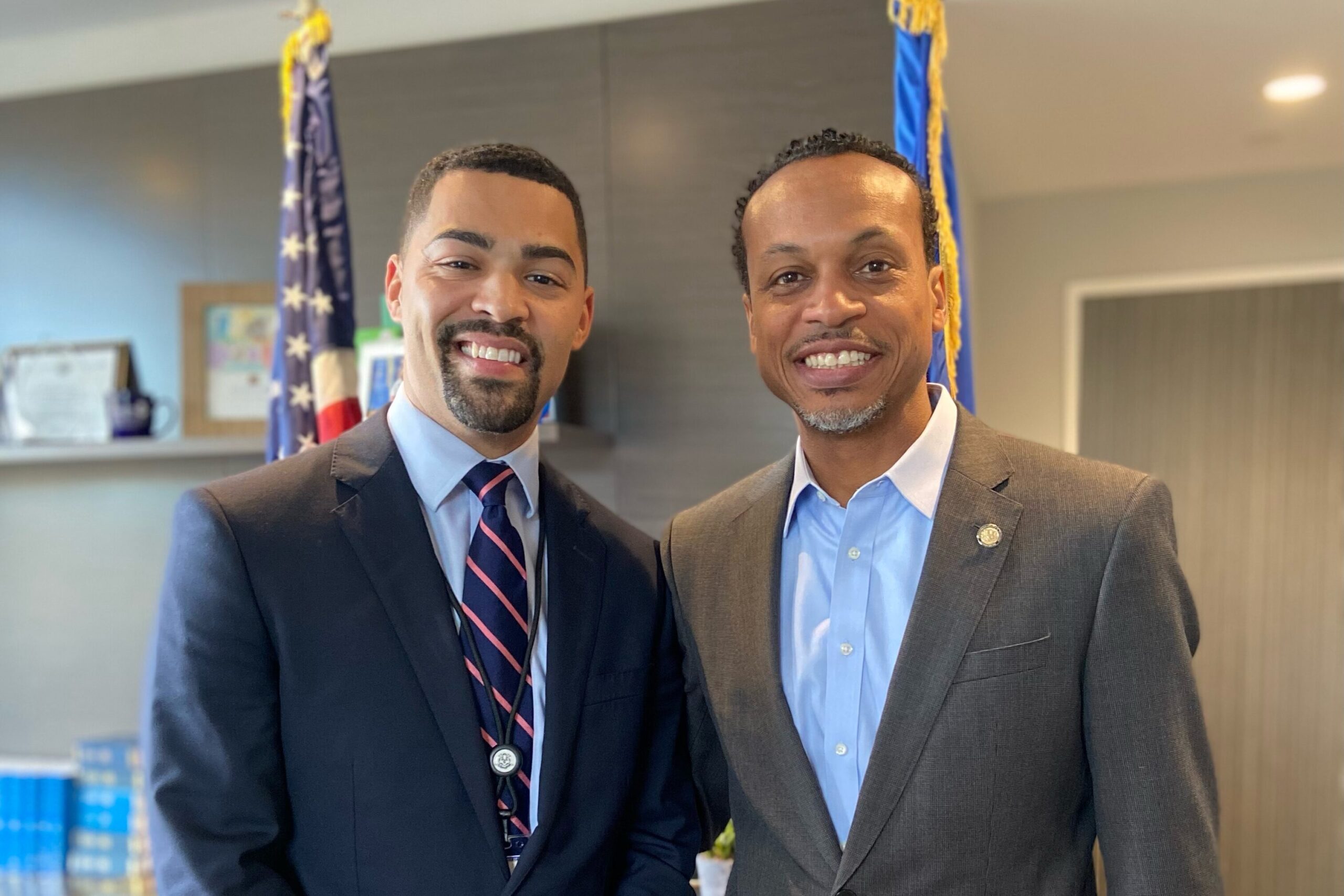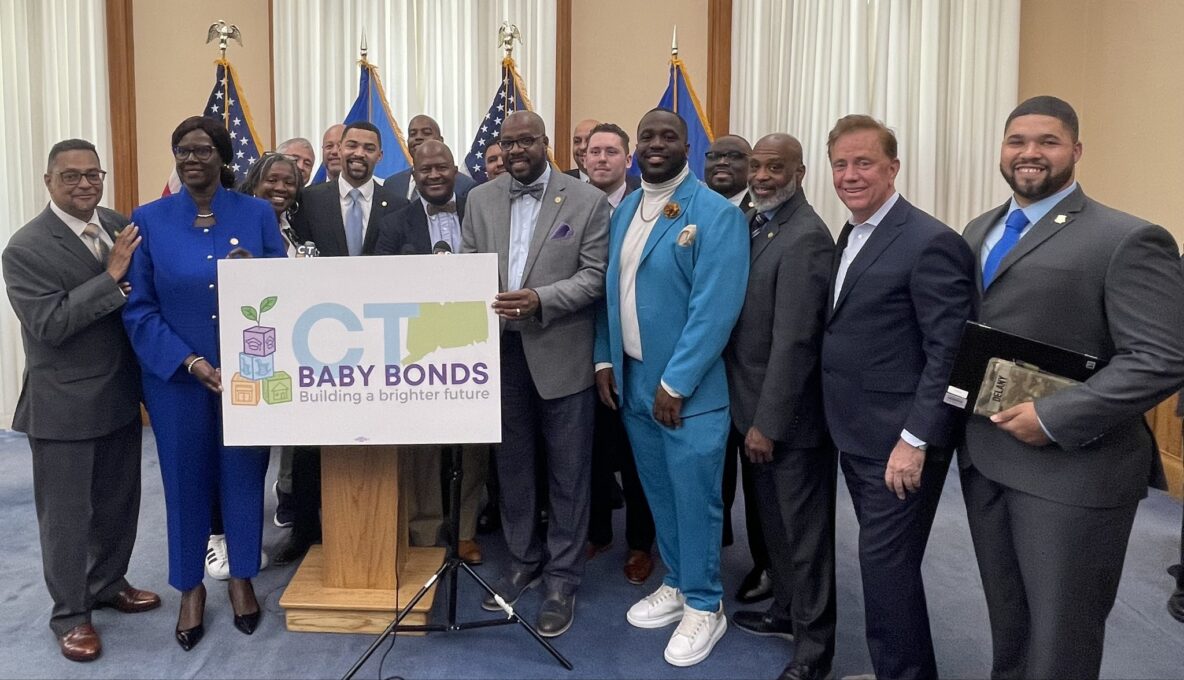
By David Radcliffe | October 18, 2023
Baby Bonds are an increasingly popular bipartisan government policy in which every child born into poverty receives a publicly funded trust account at birth. This “start-up capital” allows young adults to access education, home ownership, and entrepreneurship, enabling them to build wealth and lead lives that are hopeful, fulfilling, productive, prosperous, and self-directed. Follow our Baby Blogs series to learn about the vision, politics, and people behind Baby Bonds and their transformative impact on the lives of young people, their families, communities, and our economy.
To understand the story of Connecticut Baby Bonds, it helps to know about the place and times that shaped some of the key leaders who helped make it happen—and how having the right leaders, in the right place, at the right time, can make all the difference.
Hartford, Connecticut, in the early 1990s was a city in disarray. A sour economy layered over generations of community disinvestment and poverty fueled the rise of gangs. Many young people in the city neighborhoods had few resources or choices and were thus vulnerable to being recruited. While gangs can fill a role in providing fellowship and peer support, these gangs were more than family: they became powerful, well-organized operations centered on trafficking of narcotics and enforced by guns and violence. By 1992, Hartford had the 4th highest crime rate in the country.
In the middle of this, I was a young community organizer working out of a plain storefront office on bustling Park Street, the heart of the Frog Hollow neighborhood and less than a mile from the State Capitol. City Hall at the time was led by Mayor Carrie Saxon Perry, the first Black woman to lead a major New England City. One of her key advisors was Shawn Wooden, a resident of North Hartford (one of America’s most economically distressed neighborhoods), recent college grad, and rising political star. Although the organization where I worked frequently interacted with Perry, the ‘People’s Mayor’, I didn’t know Wooden in those early years, but was aware of him and his importance to the Mayor. Over the years, he would go on to become an attorney, elected chair of the Hartford City Council, and in 2019, the State Treasurer—at the time the only elected Black state treasurer in the country.
Time passed. I continued supporting Connecticut communities in a variety of roles. And in a curious twist of fate in 2021, Treasurer Wooden hired me as his policy director. Part of my work would be to implement the Baby Bonds policy that had been passed earlier in the year.
When he was running for Treasurer in 2018, observers noted that Wooden was interested in ways to leverage the office of the Connecticut state treasurer to address poverty. He talked about his own upbringing, how kids in his neighborhood were less likely to go to college than to leave by a coffin. In the summer of 2020, just months into the COVID pandemic and soon after the murder of George Floyd, Treasurer Wooden called out the “inconsistent protections” of the criminal-justice system for Black Americans. He also asserted that Wall Street had its own role to play in addressing the roots of the problem: “It is time for the wealthy and privileged to start pulling the levers of power they hold. Wall Street and corporate America, I’m speaking to you.”
And he practiced what he preached. Treasurer Wooden wanted to respond to George Floyd in a meaningful way and counter the severe disinvestment experienced by communities like the neighborhood where he grew up. Wooden learned of Dr. Darrick Hamilton’s Baby Bonds research and policy, which had informed U.S. Senator Cory Booker’s 2018 proposal for a federal Baby Bonds program as a potential solution to address wealth disparities and promote social and economic justice.
In line with his goals to seed reinvestment in largely disinvested communities, Wooden’s staff recrafted Booker’s proposed federal legislation for application at the state level. The proposed Connecticut Baby Bonds Trust would wield a powerful feature of the Baby Bonds policy concept: The program would be race neutral in design and implementation, as all babies born into poverty would benefit. But the impact would be race conscious, in that, with a greater percentage of Black and brown babies born into poverty, those communities would receive a proportionally greater benefit from Baby Bonds.
Wooden and his team engaged an array of community partners, with significant leadership from Connecticut Voices for Children. With bipartisan support and the strong backing of the Black and Puerto Rican legislative caucus, they led a successful campaign to pass the first state-level Baby Bonds program in the country. It was lightning in a bottle—introducing and passing big time legislation in a single, five-month legislative session in 2021.
The work wasn’t done, however. In 2022, Treasurer Wooden announced that he would not run for re-election. This development may have contributed to Connecticut Governor Ned Lamont’s team’s move to delay Baby Bonds, a drama that put the program in doubt and was well documented in local press.
Yet, during the fall of 2022, candidate for treasurer Erick Russell pledged his early support to continue the push for fully funding Baby Bonds. Russell, who grew up in New Haven and was the first person in his family to graduate from college, won the election. To bridge the Baby Bonds effort across administrations, former Treasurer Wooden, as well as Dr. Hamilton and yours truly, provided counsel and support during the transition. Once in office, Treasurer Russell and his team, along with muscle from community allies and key state legislators, all leaned into rescuing the program. By June 2023, the coalition made history: with the Governor’s support, Connecticut became the first to pass AND fully fund Baby Bonds.

Proposed and passed by Treasurer Wooden’s team, and resuscitated and funded by Treasurer Russell’s, the Connecticut Baby Bonds Trust went into effect this July, providing its first newborn enrollees with $3,200 trusts that will grow to between $11,000 and $24,000, depending on the age of withdrawal. These funds can be accessed upon adulthood for wealth-building activities like going to college, buying a house, or starting a business. Connecticut’s history in the making is now translating into the very real impact of building brighter futures for its people.
To some, having an elected state treasurer—and in this case, two—lead an effort like Baby Bonds might seem an odd match. Connecticut State Treasury (note that not all state treasury offices are the same in structure and purpose) is a constitutional office, like Secretary of State and Attorney General, and is not considered a state agency, although it does rely on a legislative appropriation for operating support. Most residents don’t pay much attention to the work of the state treasurer, as the ‘bread and butter’ of the office is typically to manage the mundane (but essential). This includes overseeing the state employee pension, issuing bond debt to pay for state projects, and making sure the state has enough cash to pay its bills. In recent years, treasurer offices have more actively leaned into financial education, retirement security, ABLE (Achieving a Better Life Experience) accounts for people with disabilities, and college savings accounts. These are all important efforts, but none have made a big dent in our pernicious wealth gap.
Given the growing role of state treasurer offices in building an economy that works for everyone, Baby Bonds are a natural extension of their long-standing interests in advancing policies, programs, and investments to foster economic well-being. It’s also helpful that a treasurer’s “big picture” and patient approach to long-term investments and returns is a perspective that helps insulate against the typically shorter-term time horizons that elected officials may take on policy and budget matters. And, significantly, since Connecticut’s progress with Baby Bonds, a number of other states—notably led by their state treasurers—have also introduced or are considering Baby Bond legislation.
Treasurer Wooden and Russell’s groundbreaking push to implement a bold idea, to meaningfully change the trajectory for all born into poverty, was the hard-fought result of a collective effort with many ingredients necessary for success. From the start, Wooden’s vision and leadership were key. He was a credible, capable leader who understood poverty and was in a position to do something about it. He also had the strategic savvy to hold open the door for an array of other legislative and community champions who also recognized the opportunity. Connecticut’s state budget situation was significantly buoyed due to an influx of Federal pandemic resources and new state fiscal guardrails, which created an environment in which something big was more possible. And Treasurer Russell’s commitment and tenacity in securing funding, after some had lost hope, cemented the program for the future of Connecticut.
Time will tell what will be the full and lasting effect of this policy and the uptake beyond Connecticut and D.C. What we do know is that for the Connecticut story of Baby Bonds, as with other important points of meaningful change, there was a unique mix of people whose extraordinary backgrounds and gifts converged at the same time to make the most of an incredible moment in American history. We’ll hear from stakeholders and explore more of the essential factors in Connecticut’s historic policy win, and progress in other places, in future installments of Baby Blogs. Stay tuned!
David Radcliffe is the State and Local Policy Director for the Institute on Race, Power and Political Economy. Prior to joining the Institute, David served as policy director for the Office of CT State Treasurer, where he supported implementation of the first-in-the-country “Baby Bonds” wealth building initiative. David was born in Ohio and grew up in a small factory town of the Appalachian foothills in western Pennsylvania. He has a strong passion for working with people to build places and economies where everyone can live happy, fulfilling, prosperous, and productive lives.
If you missed part one of our introduction to Baby Blogs, read it here.
To share feedback on this blog, or for questions about Baby Bonds, email David at radclifd@newschool.edu.
To learn more, explore our Baby Bonds resources.

